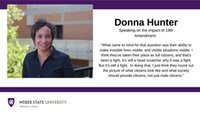| Title |
Hunter, Donna OH19_016 |
| Creator |
Weber State University, Stewart Library: Oral History Program. |
| Contributors |
Hunter, Donna, Interviewee; Harris, Kandice, Interviewer; Stokes, Alexis, Audio Technicians |
| Description |
The Beyond Suffrage Project was initiated to examine the impact women have had on northern Utah. Weber State University explored and documented women past and present who have influenced the history of the community, the development of education, and are bringing the area forward for the next generation. The project looked at how the 19th Amendment gave women a voice and representation, and was the catalyst for the way women became involved in the progress of the local area. The project examines the 50 years (1870-1920) before the amendment, the decades to follow and how women are making history today. |
| Abstract |
The following is an oral history interview with Donna Hunter, conducted on April 30, 2019 in her office, conducted by Kandice Harris. Donna discusses her life, her memories at Weber State University, and the impact of the 19th Amendment. Alexis Stokes, the audio technicican, is also present during this interview.; The following is an audio clip of an oral history interview with Donna Hunter. In this video clip, Donna discusses the impact and the importance of the 19th Amendment. |
| Subject |
Voting--United States; Women--suffrage; Women--Rights of women; Women in higher education; Counseling in higher education; Universities and colleges; Mental health services |
| Keywords |
Mental health therapists; Female therapists; Female psychologists |
| Digital Publisher |
Stewart Library, Weber State University, Ogden, Utah, United States of America |
| Date |
2019 |
| Date Digital |
2019 |
| Temporal Coverage |
1966; 1967; 1968; 1969; 1970; 1971; 1972; 1973; 1974; 1975; 1976; 1977; 1978; 1979; 1980; 1981; 1982; 1983; 1984; 1985; 1986; 1987; 1988; 1989; 1990; 1991; 1992; 1993; 1994; 1995; 1996; 1997; 1998; 1999; 2000; 2001; 2002; 2003; 2004; 2005; 2006; 2007; 2008; 2009; 2010; 2011; 2012; 2013; 2014; 2015; 2016; 2017; 2018; 2019 |
| Medium |
oral histories (literary genre) |
| Spatial Coverage |
Jersey City, City of Jersey City, Hudson, New Jersey, United States, http://sws.geonames.org/5099836, 40.72816, -74.07764; Lawrenceville, Lawrence Township, Mercer, New Jersey, United States, http://sws.geonames.org/5100356, 40.29733, -74.7296; Ogden, Weber County, Utah, United States, http://sws.geonames.org/11788968, 41.22809, -111.96766 |
| Type |
Text; Image/StillImage; Image/MovingImage |
| Access Extent |
32 page PDF; Video clip is an mp4 file, 45.3 MB |
| Conversion Specifications |
Filmed using a Sony HDR-CX430V digital video camera. Sound was recorded with a Sony ECM-AW3(T) bluetooth microphone. Transcribed using Express Scribe Transcription Software Pro 6.10 Copyright NCH Software. |
| Language |
eng |
| Rights |
Materials may be used for non-profit and educational purposes, please credit University Archives; Weber State University |
| Source |
Hunter, Donna OH19_016 Weber State University Archives |
| Format |
application/pdf; video/mp4 |
| ARK |
ark:/87278/s6ff9nx6 |
| Setname |
wsu_bs_oh |
| ID |
105428 |
| Reference URL |
https://digital.weber.edu/ark:/87278/s6ff9nx6 |
| Title |
Hunter, Donna OH19_016 |
| Creator |
Weber State University, Stewart Library: Oral History Program. |
| Contributors |
Hunter, Donna, Interviewee; Harris, Kandice, Interviewer; Stokes, Alexis, Audio Technicians |
| Description |
The Beyond Suffrage Project was initiated to examine the impact women have had on northern Utah. Weber State University explored and documented women past and present who have influenced the history of the community, the development of education, and are bringing the area forward for the next generation. The project looked at how the 19th Amendment gave women a voice and representation, and was the catalyst for the way women became involved in the progress of the local area. The project examines the 50 years (1870-1920) before the amendment, the decades to follow and how women are making history today. |
| Abstract |
The following is an oral history interview with Donna Hunter, conducted on April 30, 2019 in her office, conducted by Kandice Harris. Donna discusses her life, her memories at Weber State University, and the impact of the 19th Amendment. Alexis Stokes, the audio technicican, is also present during this interview. |
| Image Captions |
Donna Hunter 2019 |
| Subject |
Voting--United States; Women--suffrage; Women--Rights of women; Women in higher education; Counseling in hier education; Universities and colleges; Mental health services |
| Keywords |
Mental health therapists; Female therapists; Female psychologists |
| Digital Publisher |
Stewart Library, Weber State University, Ogden, Utah, United States of America |
| Date Digital |
2019 |
| Temporal Coverage |
1966; 1967; 1968; 1969; 1970; 1971; 1972; 1973; 1974; 1975; 1976; 1977; 1978; 1979; 1980; 1981; 1982; 1983; 1984; 1985; 1986; 1987; 1988; 1989; 1990; 1991; 1992; 1993; 1994; 1995; 1996; 1997; 1998; 1999; 2000; 2001; 2002; 2003; 2004; 2005; 2006; 2007; 2008; 2009; 2010; 2011; 2012; 2013; 2014; 2015; 2016; 2017; 2018; 2019 |
| Medium |
oral histories (literary genre) |
| Spatial Coverage |
Jersey City, City of Jersey City, Hudson, New Jersey, United States, http://sws.geonames.org/5099836, 40.72816, -74.07764; Lawrenceville, Lawrence Township, Mercer, New Jersey, United States, http://sws.geonames.org/5100356, 40.29733, -74.7296; Ogden, Weber County, Utah, United States, http://sws.geonames.org/11788968, 41.22809, -111.96766 |
| Type |
Text; Image/StillImage |
| Access Extent |
32 page PDF |
| Language |
eng |
| Rights |
Materials may be used for non-profit and educational purposes, please credit University Archives; Weber State University |
| Source |
Hunter, Donna OH19_016 Weber State University Archives |
| Format |
application/pdf |
| Setname |
wsu_bs_oh |
| ID |
105545 |
| Reference URL |
https://digital.weber.edu/ark:/87278/s6ff9nx6/105545 |





